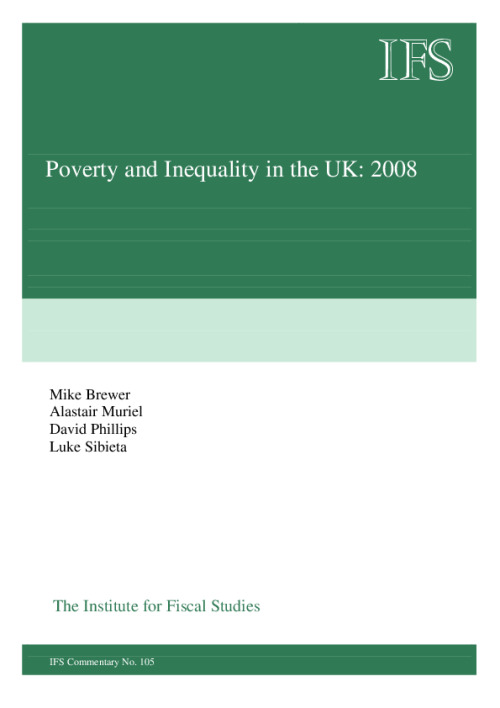Downloads

comm105.pdf
PDF | 626.28 KB
In this Commentary, we assess the changes to average incomes, inequality and poverty that have occurred under the first 10 years of the Labour government, with a particular focus on the changes that have occurred in the latest year of data. This analysis is based upon the latest figures from the DWP's Households Below Average Income (HBAI) series, published on 10 June 2008 (Department for Work and Pensions, 2008c). The HBAI series takes household income as its measure of living standards and is derived from the Family Resources Survey, a survey of around 28,000 households in the United Kingdom that asks detailed questions about income from a range of sources.
Click here to access data on living standards, poverty and inequality since 1961 and to view our other annual reports on the topic.
Authors

Mike Brewer

Research Fellow
Luke is a Research Fellow at the IFS and his general research interests include education policy, political economy and poverty and inequality.

Alastair Muriel

Associate Director
David is Head of Devolved and Local Government Finance. He also works on tax in developing countries as part of our TaxDev centre.
Report details
- DOI
- 10.1920/co.ifs.2008.0105
- Publisher
- IFS
Suggested citation
Brewer, M et al. (2008). Poverty and Inequality in the UK: 2008. London: IFS. Available at: https://ifs.org.uk/publications/poverty-and-inequality-uk-2008 (accessed: 3 May 2024).
More from IFS
Understand this issue

Sure Start achieved its aims, then we threw it away
15 April 2024

Social mobility and wealth
12 December 2023

How important is the Bank of Mum and Dad?
15 December 2023
Policy analysis

Living standards since the last election
21 March 2024

Major challenges for education in Wales
21 March 2024

Sliding education results and high inequalities should prompt big rethink in Welsh education policy
21 March 2024
Academic research

Police infrastructure, police performance, and crime: Evidence from austerity cuts
24 April 2024

Labour market inequality and the changing life cycle profile of male and female wages
15 April 2024

There and back again: women’s marginal commuting costs
2 April 2024